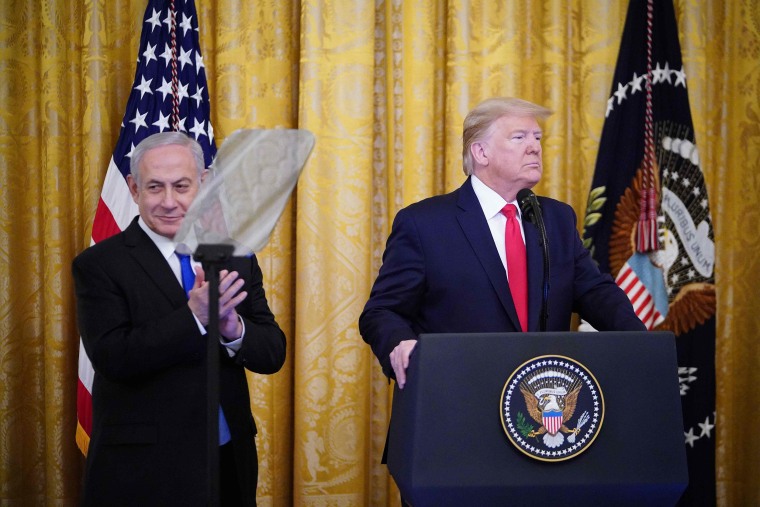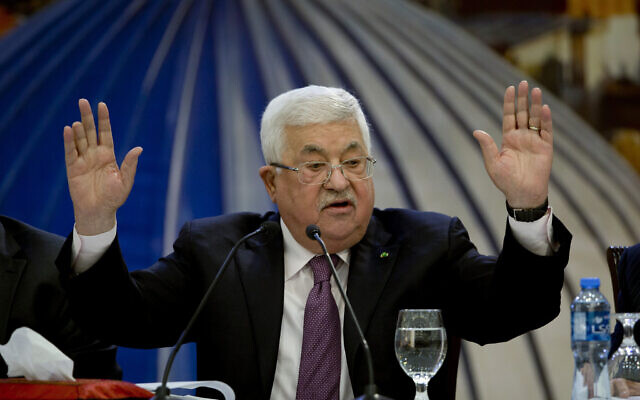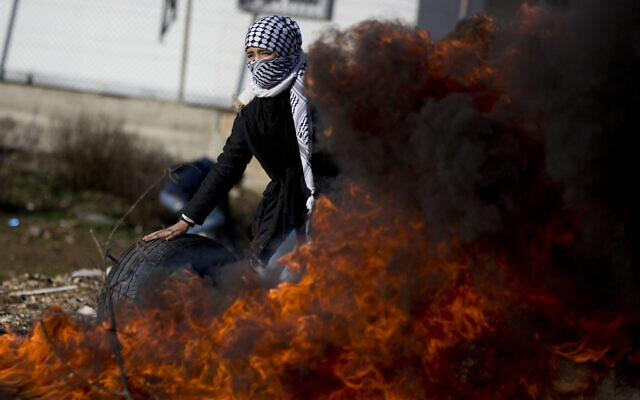When no Agreement is Possible and Peace Eludes
"Today Israel takes a big step towards peace. My vision presents a win-win opportunity for both sides, a realistic two-state solution that resolves the risk of Palestinian statehood to Israel's security."
U.S. President Donald Trump
"[It may take the Palestinians] a very long time [to get an independent state, but] if they agree to abide by all the conditions you've laid out in your plan, Israel will be there."
Israeli President Benjamin Netanyahu
 |
After rejecting the 1947 Partition plan that the United Nations offered, Palestinian leaders and negotiators rejected one offer after another, each offer coming closer and closer to the entitlements that the Palestinians demanded as their right, until the last gave them everything, and they still found fault and had no problem rejecting it. And to this one, which doesn't give them their demands by any means, but places restrictions and responsibilities on the Palestinians a definite response has resulted from PA President Mahmoud Abbas: "We say 'no', and a thousand times 'no'".
 |
| Pres.Abbas, Ramallah. Tuesday, Jan. 22, 2020. (AP Photo/Majdi Mohammed) |
The only possible 'peace plan' acceptable to the Palestinian leadership, it seems patently obvious, is to give to them what surrounding Arab national leaders before 1948 never considered: agreement on allowing the Arab peoples who now call themselves 'Palestinians' -- co-opting that identity from the actual Jewish Palestinians to match their contentions that all ground historically sacred to Judaism, notable Judaic figures and symbols were really Arab Palestinian -- to declare themselves a nation.
Under the revealed plan that President Trump takes credit for, Israel's sovereignty over all the Jewish settlements in the Judaic heritage region of Samaria and Judea -- which the international community is content to call the West Bank, ceding it thus to the Palestinians -- is established. The Jordan Valley, another heritage Judaic region, is also to come under Israeli annexation, to retrieve to the Jewish State geography that was once its and is now again.
The Palestinians are left with areas of territory carved out of Samaria and Judea which roads are to connect for the establishment of their state, connecting to Gaza through a tunnel. Surrounding Arab armies marched on Israel time and again to destroy it and each of those conflicts failed to succeed. Israel's military, at the cost of many Jewish lives, defended its right to exist, and its territory. It took East Jerusalem from the illegal occupation of Jordan, and the Sinai from Egypt.
In any other similar conflict of defence and victory, the victor has always historically absorbed the territory defended and acquired. In Israel's case, surrender of the Sinai came with a peace agreement with Egypt. And Jordan was graciously accorded by Israel control of the Temple Mount, Israel's most sacred Judaic site, whereas under Jordanian control, Jews were expelled from the Old City and never permitted access to Judaism's most holy site.
Now, Trump's plan for peace gives Israel full sovereignty over Jerusalem, the Old City and holy sites, including the al-Aqsa mosque, representing the third holiest site for Islam. Neighbourhoods to the east of the city would be given to the Palestinians and there they are able to establish their capital for a Palestinian state that could be established on meeting conditions including recognition of Israel as a Jewish state; that Hamas must disarm; and Israel maintain military control of the area.
All conditions that can be negotiated further in direct negotiations between the established and the nascent state. President Trump, whom Mahmoud Abbas refuses to meet with, is giving the Palestinian Authority four years to ponder and accept the proposal. In response President Abbas appeared on television announcing his rejection of the plan as soon as it was released. "I am ready to die for the sake of my people", he floridly promised.
Today, the day following the release of the Trump peace plan, Hamas and Fatah, two deadly opposed Palestinian factions, both fully immersed in terrorism, met to coordinate opposition to the plan they have reviled. A "Day of Rage" was called for. Nothing odd or unusual about that. Arab Palestinians have been expressing their rage over the presence of Israel since it declared itself prepared to accept the UN invitation to re-establish its nationhood on a tiny sliver of land, a partial portion of its former, Biblical-era glory.
 |
| A masked Palestinian protester sets tires on fire during clashes with Israel forces as they protest Middle East peace plan announced Tuesday by US President Donald Trump, which strongly favors Israel, at Beit El checkpoint, near the West Bank city of Ramallah, Wednesday, Jan 29, 2020 (AP Photo/Majdi Mohammed) |
Labels: Israel, Palestinian Authority, Peace Plan, United States
0 Comments:
Post a Comment
<< Home